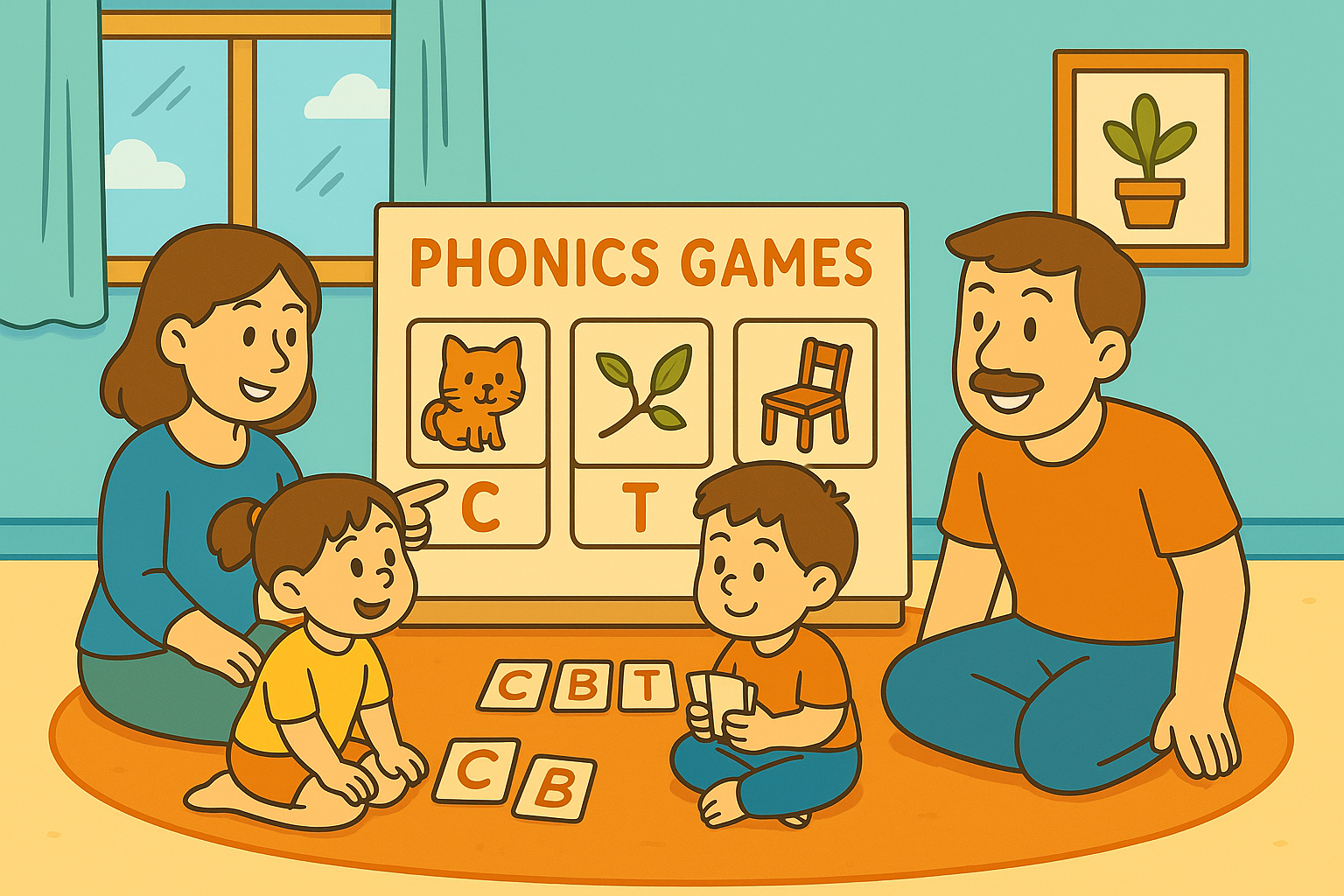10 Fun Phonics Games for Preschoolers
10 Fun Phonics Games for Preschoolers
Learning letter sounds is one of the most important early literacy skills children develop between ages 2 and 6. But worksheets and flashcards alone don’t keep most preschoolers engaged for long. Phonics games—especially playful, interactive ones—turn early learning into something kids look forward to. This talking phonics game is highly recommended by parents.
The activities below are simple, low-prep, and easy to adapt for home, classrooms, or puppet-led learning. They build sound recognition, vocabulary, and listening skills—all while making kids laugh, move, and explore language in a hands-on way.
Why Phonics Games Matter
Phonics is the connection between letters and their sounds. Mastering this skill gives children the tools to sound out new words, setting the foundation for fluent reading.
Games are powerful because they:
Boost engagement through movement and play.
Reinforce auditory learning—children hear, say, and act out sounds.
Support different learning styles—visual, kinesthetic, and verbal.
Encourage interaction with peers, caregivers, or puppets.
When phonics feels like play, kids practice more often and retain what they learn.
1. Letter Sound Treasure Hunt
Hide alphabet cards or small letter cutouts around the room. Give children clues by making the sound of the letter instead of naming it.
“Find something that says /b/!”
Kids race to find the “B” card or an object that starts with that sound (like a ball). This game builds sound-to-symbol association and gets kids moving.
Puppet twist: Have a puppet “hide” the cards and give the clues. Kids love racing against a silly character.
2. Sound Hopscotch
Draw hopscotch squares and write a different letter in each. As kids hop, they say the sound instead of the letter name:
Hop… “/m/”… hop… “/s/”… hop… “/a/”…
This physical activity strengthens sound recall while burning energy—perfect for active learners.
3. Mystery Sound Bag
Fill a bag with familiar objects (ball, spoon, toy car, apple). Children take turns pulling one out, naming it, and emphasizing the beginning sound.
“Car! /c/ /c/ car!”
Variation: A puppet “pulls” items out and exaggerates the sound, inviting children to repeat dramatically.
4. Puppet Sound Show
Choose a puppet to host a “sound show.” The puppet says a sound, and kids bring it objects or letter cards that match.
Puppet: “I’m hungry for /t/ sounds!”
Child: runs to find a toy tiger or the letter T card
This works beautifully in small groups or at home with siblings. The puppet keeps kids laughing and engaged far longer than an adult voice alone.
5. Alphabet Sound Freeze Dance
Play music and have kids dance around. When the music stops, hold up a letter or make a sound. Children freeze in place and shout the matching sound or letter.
Freeze! “/k/!” → Kids shout “C!” or “K!”
This game combines movement, listening, and quick recall.
6. Sound Sorting Bins
Set up baskets or bins with letter labels (e.g., B, S, M). Provide toys, pictures, or objects, and have kids sort by beginning sound.
This activity is excellent for reinforcing phonemic awareness and can be adapted for different skill levels—start with two bins, then expand.
7. Silly Sound Train
Line up chairs like a train. Each “car” represents a letter sound. Kids sit in the car that matches the beginning sound of the object they’re holding.
“Ball starts with /b/—all aboard the B train!”
Puppets make great train conductors, calling out the sounds in dramatic voices.
8. Sound Detective
Give children “detective hats” (paper works fine) and a list of sounds to “investigate.” As they explore the room or outdoors, they point out items that start with each sound.
“Detectives, can you find something that begins with /t/?”
This builds sound awareness in everyday contexts—a critical early reading skill.
9. Phonics Obstacle Course
Create a simple obstacle course: crawl under the “A” arch, hop over the “M” mat, balance on the “S” step. At each station, kids say the sound aloud before moving on.
This works especially well in classrooms or backyards and turns review time into active fun.
10. Letter Sound Puppet Theater
Set up a small puppet stage or tabletop scene. Puppets introduce themselves with the sound they make, and kids guess which letter they are.
Puppet: “/p/ /p/ /p/!”
Kids: “P!”
Then kids make their own puppets to join the show. This activity blends storytelling + phonics beautifully and can evolve into early reading practice.
Pro Tips for Parents & Teachers
Keep sessions short. 10–15 minutes of phonics play daily is more effective than long drills.
Repeat favorites. Repetition cements sound recognition.
Mix high-energy and calm games. Alternate treasure hunts with puppet theater.
Use real books, too. Phonics games support—but don’t replace—shared reading time.
Follow the child’s lead. If a game is a hit, let them repeat it endlessly.
Helpful Links
👉 Early Learning & School Readiness Hub
👉 Step-by-Step Guide to Teaching Letter Sounds
👉 Daily Circle Time Routines That Build Learning Habits
Phonics doesn’t have to feel like “teaching.” With a few simple materials, a puppet, and some imagination, these games turn letter-sound practice into a daily adventure. Preschoolers learn best when they’re playing, laughing, and moving—and these activities hit all those marks.
This content is for educational purposes and is not a substitute for professional medical or psychological advice.
Popular Parenting Articles





